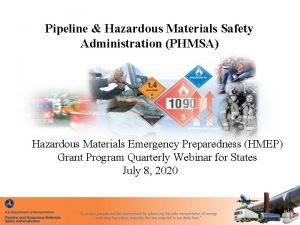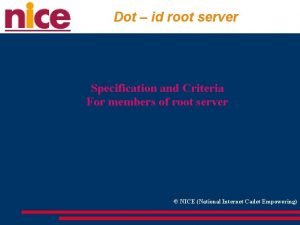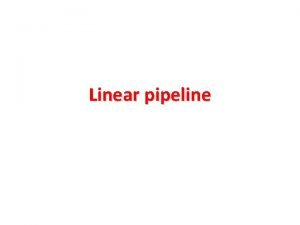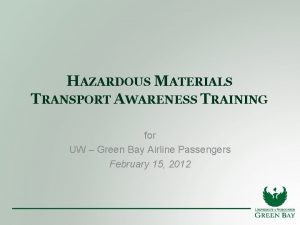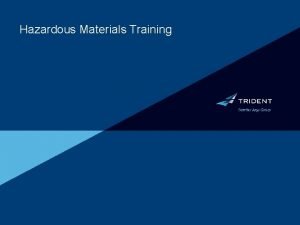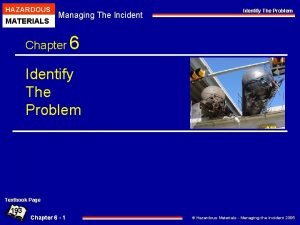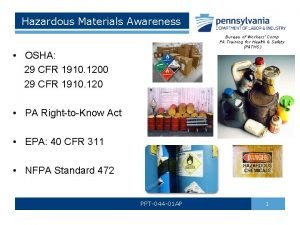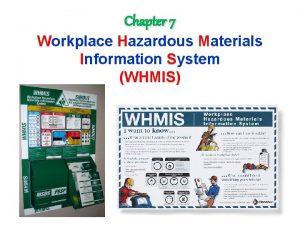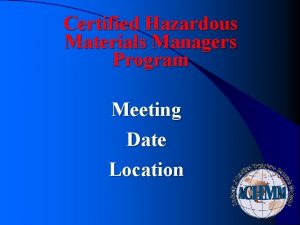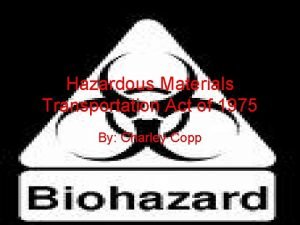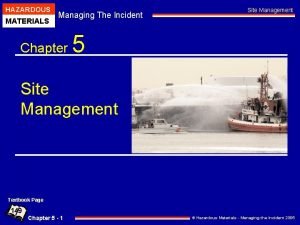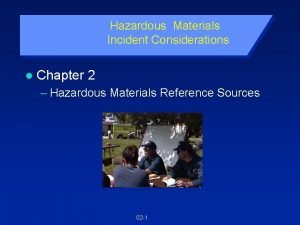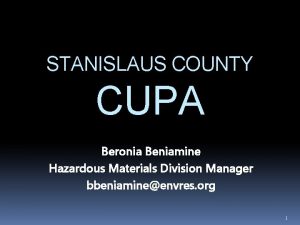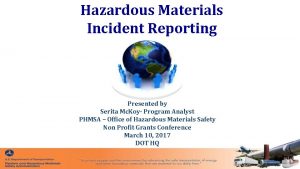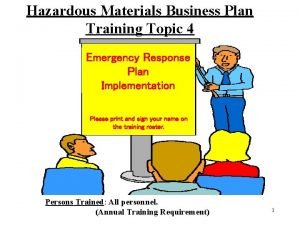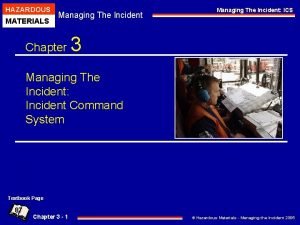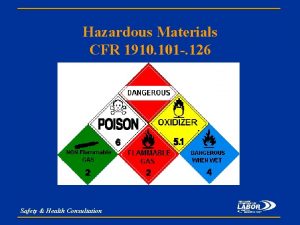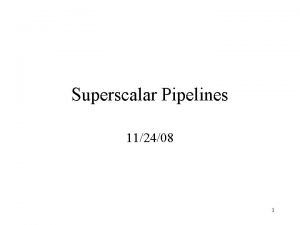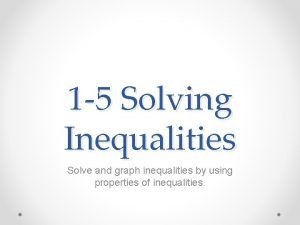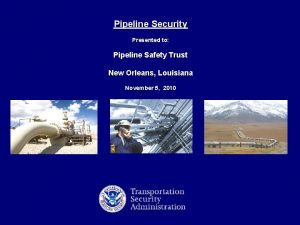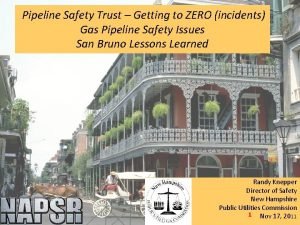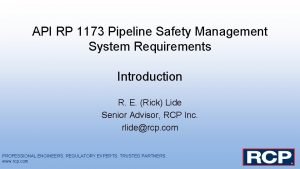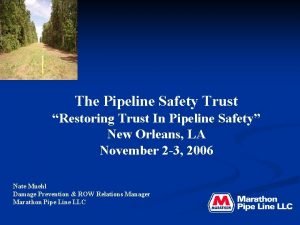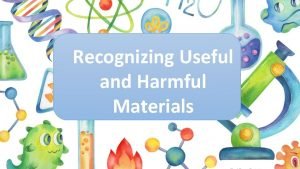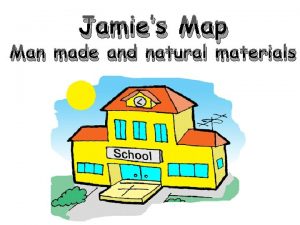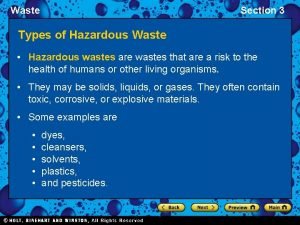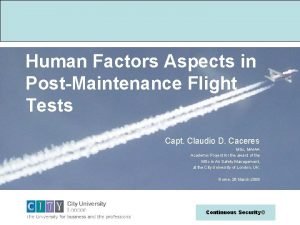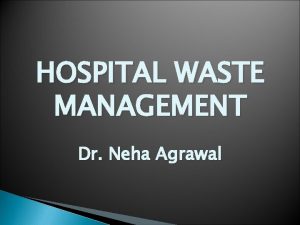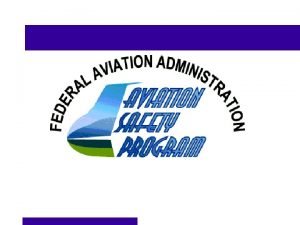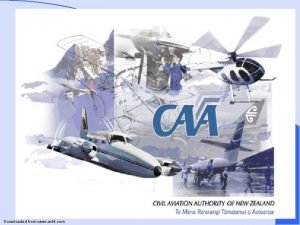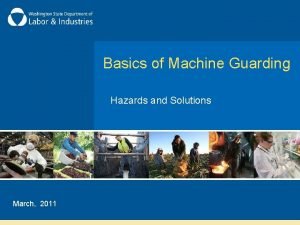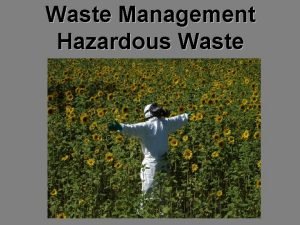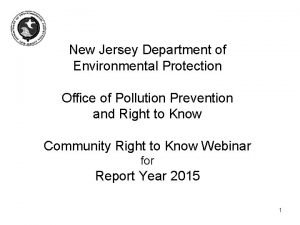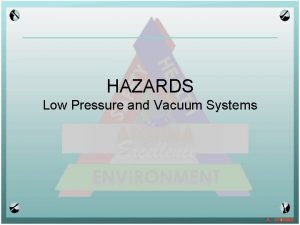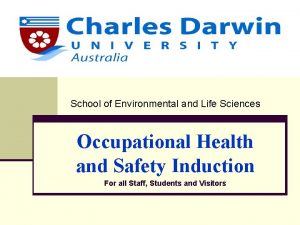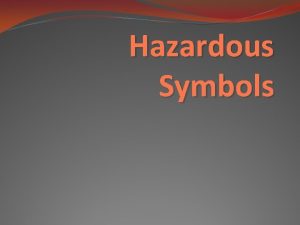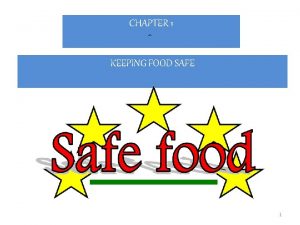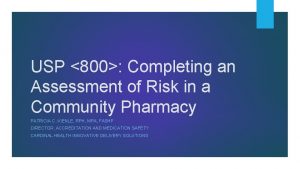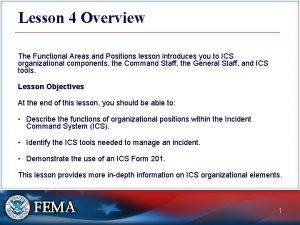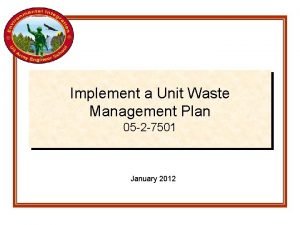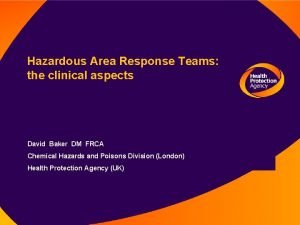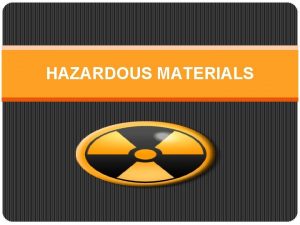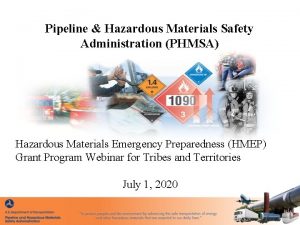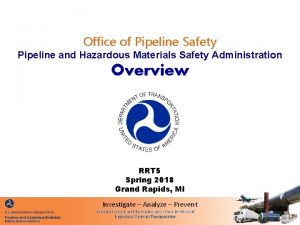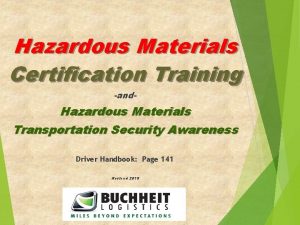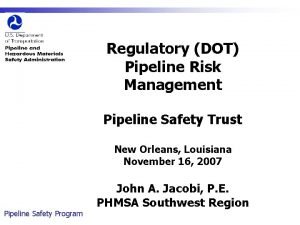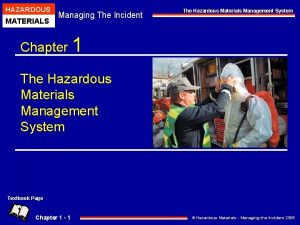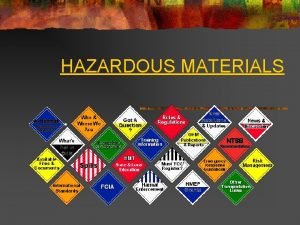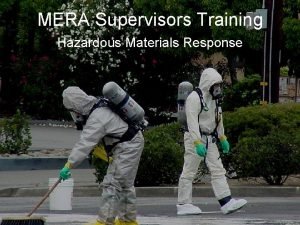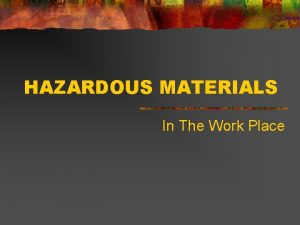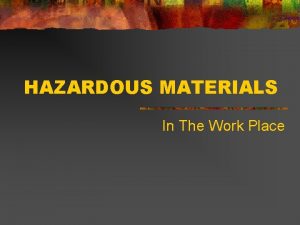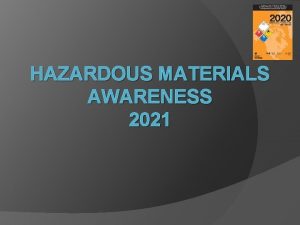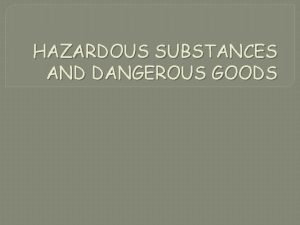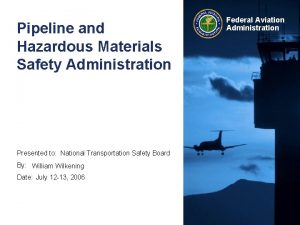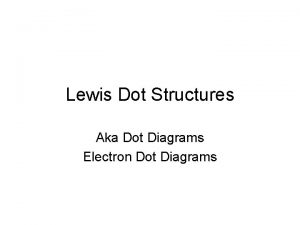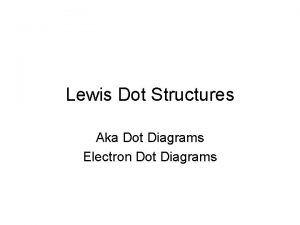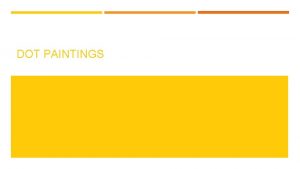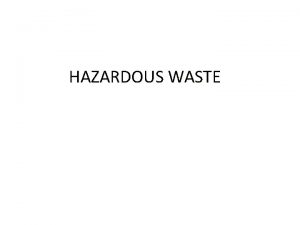U S DOT Pipeline and Hazardous Materials Safety














































- Slides: 46

U. S. DOT Pipeline and Hazardous Materials Safety Administration PHMSA Regulatory Update Tuesday, August 23, 2016 9: 00 -9: 45 AM 2016 Western Region Gas Conference

Gas NPRMs can be found here or linked on the PHMSA website

PHMSA Website Locations for Regulatory Status Interpretations (Search by date or regulation) http: //www. phmsa. dot. gov/pipeline/regs/interps Special Permits and State Waivers http: //www. phmsa. dot. gov/pipeline/regs/special-permits Rulemakings (tabular with links to detail) http: //www. phmsa. dot. gov/pipeline/regs/rulemaking Advisory Bulletins (tabular with links to detail) http: //www. phmsa. dot. gov/pipeline/regs/advisory-bulletin And more ….


PHMSA Technical Advisory Committee Meeting June, 2016 • http: //www. phmsa. dot. gov/pipeline/june 1 -to-june 32016 -gas-liquid-and-joint-committee-meetings • Key Gas Topics from Joint meeting included: – Plastic Pipe Proposed Rule – Operator Qualification Proposed Rule – Gas Transmission and Gas Gathering Proposed Rule


Current Rulemakings in Process Safety of Gas Transmission and Gathering Lines (NPRM stage) q NPRM published 4/8/2016 q. Comment period closed 7/7/2016 q Major Topics under consideration: • Expansion of assessments beyond HCA’s – MCA’s • Repair criteria for both HCA and non-HCA areas • Assessment methods • Corrosion control • Gas gathering; additional reporting and regulations • Assessment methods for GT Lines • Grandfathered pipe/pipe records/legacy - IVP -7 -

Gas IM NPRM Webinar – Be Informed • Materials from the June 8 th Webinar are posted at http: //primis. phmsa. dot. gov/meetings/Mtg. Home. mtg? mtg=117 8 -

Current Rulemakings in Process EFV Expansion beyond Single Family Residences (NPRM stage) q. NPRM published 7/15/2015; Comment period ended 9/14/2015 q. GPAC meeting 12/17/15 q. Major Topics • Rule proposes to require EFVs for: – branched service lines serving more than one single family residence – multi-family residential dwellings – commercial buildings – Final rule anticipated in the fall of 2016

Current Rulemakings in Process Operator Qualification, Cost Recovery and Other Pipeline Safety Proposed Changes (NPRM stage) q NPRM published 7/10/15; comment period ended 9/8/2015 q This rule will address reauthorization issues related to: • Operator Qualification for new construction • Incident Reporting • Cost Recovery • Assessment methods for HL lines (NACE petition) • Renewal process for special permits • API 1104 and in-service welding • PAC meeting June 1 -3, 2016 • Final rule anticipated in the fall of 2016.

Current Rulemakings in Process Plastic Pipe (NPRM stage) q NPRM published May 21, 2015; Comment period ended 7/31/2015 q Address the following plastic pipe topics: • Authorized use of PA 12 • AGA petition to raise D. F. from 0. 32 to 0. 40 for PE pipe • Tracking and traceability • Miscellaneous revisions for PE and PA 11 pipelines • Additional provisions for fittings used on plastic pipe • GPAC meeting for June 1 -3, 2016 • Final rule anticipated in the fall of 2016

Current Rulemakings in Process Rupture Detection and Valve Rule (NPRM stage) q This rule would establish and define rupture detection and response time metrics including the integration of Automatic Shutoff Valves (ASV) and Remote Control Valve (RCV) placement as necessary, with the objective of improving overall incident response q This rule responds to requirements of the Pipeline Safety, Regulatory Certainty, and Job Creation Act of 2011 (The Act): • Section 4: ASV/RCV or equivalent technology be installed on newly constructed or entirely replaced natural gas and hazardous liquid transmission pipelines 2 years after the act was issued • Section 8: Require operators of hazardous liquid pipeline facilities to use leak detection systems and establish standards for their use. • The Act also mandated two studies of leak detection and response, one by the GAO, and one by PHMSA. q Also - Two NTSB Recommendations related to valves and leak detection

Rupture Detection and Mitigation Rule Projected Date for NPRM Publication-Fall 2016 • Require Valve installation and Minimum Rupture Detection Standards • Overall intent is that rupture detection metrics will be integrated with ASV and RCV placement with the objective of improving overall incident response • Propose installation of automatic shutoff valves, remote controlled valves, or equivalent technology and establish performance based meaningful metrics for rupture detection for gas and liquid transmission pipelines

Current Rulemakings in Process Underground Storage Facilities for Natural Gas (NPRM/IFR stage) q This rule would require operators of underground storage facilities for natural gas to comply with minimum safety standards, including compliance with: q. API RP 1171, Functional Integrity of Natural Gas Storage in Depleted Hydrocarbon Reservoirs and Aquifer Reservoirs q. API RP 1170, Design and Operation of Solution-mined Salt Caverns Used for Natural Gas Storage q. Annual and Incident reporting requirements q PHMSA is considering adopting the non-mandatory provisions of the RPs in a manner that would make them mandatory, except that operators would be permitted to deviate from the RPs if they provide justification.

Workshop on U/G Natural Gas Storage • Solicit input and obtain background information concerning U/G natural gas storage safety. • The public workshop held on July 14, 2016 in Broomfield, Colorado http: //primis. phmsa. dot. gov/meetings/Mtg. Home. mtg? mt g=115 • Currently, throughout the US, approximately 400 interstate and intrastate underground natural gas storage facilities are operating with more than four trillion cubic feet of natural gas working capacity • API RP 1170 & 1171 are standards in place that cover design, operation, and mechanical integrity topics on U/G salt cavern storage and depleted reservoirs

Current Rulemakings in Process Inflation Adjustment of Maximum Civil Penalties (IFR Stage) q Interim Final Rule Published 6/30/2016 q Revise references in its regulations to the maximum civil penalties for violations of the Federal Pipeline Safety Laws, or any PHMSA regulation or order issued thereunder. q Under the “Federal Civil Penalties Inflation Adjustment Act Improvements Act of 2015, ” which further amended the “Federal Civil Penalties Inflation Adjustment Act of 1990, ” federal agencies are required to adjust their civil monetary penalties effective August 1, 2016, and then annually thereafter, to account for changes in inflation. q PHMSA found good cause to amend the regulation related to civil penalties without notice and opportunity for public comment.

Current Rulemakings in Process Standards Update (NPRM stage) q Major Topics: • Addresses the set of IBR standards throughout PHMSA’s part 192, Part 193 and Part 195 code with updated revisions of standards from all standard organization bodies. • This NPRM would impact approx. 20 of the 60+ standards that we currently IBR. • Per recent statute (Section 24, revised) all IBR standards pertaining to PSR must be available for free to the public. (Most SDOs comply) – ANSI IBR portal – ibr. ansi. org • Miscellaneous amendments to PSR – GPTC petitions – Agency initiative

Current Rulemakings in Process State Certification (NPRM stage) q Rulemaking would amend 49 CFR Part 198 by incorporating into PHMSA’s regulations existing statutory procedures in the Federal pipeline safety laws regarding the certification of State authorities to regulate intrastate gas and hazardous liquid pipelines q Address the process by which PHMSA and State authorities may enter into interstate-agent and other agreements for State authorities to assist PHMSA in the regulation and inspection of both interstate and intrastate pipelines. q The proposed rule also establishes more formal procedures for suspending, modifying, or rejecting both the certification of State authorities to regulate intrastate pipelines and for terminating interstateagent and other agreements between PHMSA

Current Rulemakings in Process PIIPES ACT of 2016 q. Signed by the President on June 22, 2016 q. Contains a number of mandates - those related to rulemakings are: • Emergency Orders • Underground Storage • LNG – siting of small scale • Changes in HL HCA definition • 12 month assessments of certain HL lines • Reporting requirement for unfinished mandates

Report on DOT Significant Rulemakings • https: //www. transportation. gov/regulations /report-on-significant-rulemakings • The Significant Rulemakings Report provides a summary and the status for all significant rulemakings that DOT currently has pending or has issued recently.

Final Rules

Damage Prevention Final Rule Pipeline Damage Prevention Programs • Effective January 1, 2016 • Affects 49 CFR Parts 196 and 198 – Sets criteria for State damage prevention laws – If States can’t or don’t meet criteria PHMSA can take over jurisdiction – Exceptions are possible, however they must be approved and justified

Damage Prevention Final Rule “For the reasons discussed above, PHMSA is not considering alternatives 1 and 3. Under alternative 2, PHMSA will enforce a minimum Federal safety requirement against any excavator who violates applicable damage prevention requirements in a State with an excavation damage prevention enforcement program determined to be inadequate. ”

Update to Miscellaneous Final Rule Po s § 192. 305 Inspection: General. tp • o n Each transmission line and main must be e inspected to ensure that it is constructed in d ! accordance with this subpart. An operator must not use operator personnel to perform a required inspection if the operator personnel performed the construction task requiring inspection. Nothing in this section prohibits the operator from inspecting construction tasks with operator personnel who are involved in other construction tasks.

Update to Miscellaneous Final Rule Po stp Construction Inspection (Cont’d) Responsibility to Conduct Construction Inspections § § 192. 305 and 195. 204 • PHMSA proposed to revise § 192. 305 to specify that a transmission pipeline or main cannot be inspected by someone who participated in its construction. i. e. , the individual who performed the construction task that requires inspection on ed !

Update to Miscellaneous Final Rule Po stp Construction Inspection (Cont’d) • PHMSA believes that allowing individuals to inspect their own work defeats, in part, the measure of safety garnered from such inspections. • PHMSA was not intending to require third-party inspections or attempting to prohibit any person from a company to inspect the work of another person from the same company. on ed !

Advisory Bulletins

ADB-2016 -05 • Subject: Clarification of Terms Relating to Pipeline Operational Status • PHMSA regulations do not recognize an “idle” status for a hazardous liquid or gas pipelines. The regulations consider pipelines to be either active and fully subject to all parts of the safety regulations or abandoned.

ADB-2016 -05 • The process and requirements for pipeline abandonment are captured in §§ 192. 727 and 195. 402(c)(10) for gas and hazardous liquid pipelines, respectively. Pipelines abandoned after the effective date of the regulations must comply with requirements to purge all combustibles and seal any facilities left in place. • The last owner or operator of abandoned offshore facilities and abandoned onshore facilities that cross over, under, or through commercially navigable waterways must file a report with PHMSA. • PHMSA regulations define the term “abandoned” to mean permanently removed from service.

ADB– 2016– 04 • Subject - Ineffective Protection, Detection, and Mitigation of Corrosion Resulting From Insulated Coatings on Buried Pipelines • PHMSA’ failure investigation of the Plains Pipeline May 19, 2015, accident in Santa Barbara, CA • Operators are reminded to review their pipeline operations to ensure that pipeline segments that are both buried and insulated have effective coating and corrosion-control systems to protect against cathodic protection shielding, conduct inline inspections for all threats, and ensure in-line inspection tool findings are accurate, verified, and conducted for all pipeline threats.

ADB– 2016– 04 • The need for coatings and CP systems to be designed, installed, and maintained so as not to foster an environment of shielding and moisture that can lead to excessive external corrosion growth rates and pipe steel cracking such as stress corrosion cracking • Coatings for buried, insulated pipelines that may result in cathodic protection “shielding” yet still comply with 49 CFR Part 192, Subpart I or 49 CFR Part 195, Subpart H. Inadequate corrosion prevention may be addressed through any one or more methods, or a combination of methods described in ADB– 2016– 04

ADB– 2016– 04 • Employ ILI data analysis techniques to account for the potential growth of Corrosion Under Insulation, including interaction criteria for anomaly assessment • ILI data, subsequent analysis of the data, and pipeline excavations should: – Confirm the accuracy of the ILI data to characterize the extent and depth of the external corrosion and ILI tolerances and unity charts – Follow the ILI guidelines of API Standard 1163 – Use additional or more frequent reassessment intervals and confirmations – Assess and mitigate operational and environmental conditions in shielded and insulated coatings that lead to excessive corrosion growth rates, pipe steel cracking, and all other threats.

ADB-2016 -03 • Owners and Operators of Petroleum Gas and Natural Gas Facilities in Areas Subject to Heavy Snowfall or Abnormally Icy Weather • Subject: Dangers of Abnormal Snow and Ice Build-up on Gas Distribution Systems • To remind owners and operators of the need to (1) monitor the potential impact of excessive snow and ice on these facilities; and (2) inform the public about possible hazards from snow and ice accumulation on regulators and other pipeline facilities

ADB-2016 -03 • Notify customers and other entities of the need for caution associated with excessive accumulation and removal of snow and ice • Pay attention to snow and ice related situations that may cause operational problems for pressure control and other equipment • Monitor the accumulation of moisture in equipment and snow or ice blocking regulator or relief valve vents which could prevent regulators and relief valves from functioning properly

ADB-2016 -03 • The piping on service regulator sets is susceptible to damage that could result in failure if caution is not exercised in cleaning snow from around the equipment • Remind the public to contact the gas company or designated emergency response officials if there is an odor of gas present or if gas appliances are not functioning properly

ADB– 2016– 02 • Subject: To Owners and Operators of Underground Pipeline and Storage Facilities regarding the Safe Operation of Underground Storage Facilities for Natural Gas • Operators of underground storage facilities used for the storage of natural gas, as defined in 49 CFR Part 192, should review their O, M & ER activities to ensure the integrity of underground storage facilities are properly maintained

ADB– 2016– 02 • In addition, operator’s O&M processes and procedures should be reviewed and updated at least annually, unless operational inspections for integrity warrant shorter review periods. • O&M processes and procedures should include data collection and integration, risk assessments, monitoring, operational limits, mitigation measures, and record keeping for any underground storage facility threat that could impact public safety, operating personnel, or the environment due to leakage, failure, or abnormal operating conditions whether above ground or underground.

ADB– 2016– 01 • Potential for Damage to Pipeline Facilities Caused by Severe Flooding. • Similar to ADB-2015 -01 as these events continue to occur – titled “Potential for Damage to Pipeline Facilities Caused by Flooding, River Scour, and River Channel Migration” • Several ADBs on this topic, and please review them all if applicable to your operations

ADB 2016 -01 Events referenced include: • July 1, 2011, Exxon. Mobil Pipeline Company experienced a pipeline failure near Laurel, Montana 63, 000 gallons of crude oil spilled into the Yellowstone River • July 15, 2011, Nu. Star Pipeline Operating Partnership, L. P. reported a 4, 200 gallon (100 barrels) anhydrous ammonia spill in the Missouri River in Nebraska • August 13, 2011, Enterprise Products Operating, LLC discovered a release of 28, 350 gallons (675 barrels) of natural gasoline in the Missouri River in Iowa • January 17, 2015, a breach in the Bridger Pipeline Company’s Poplar System resulted in another spill into the Yellowstone River near the town of Glendive, Montana, releasing an estimated 28, 434 gallons of crude oil into the river and impacting local water supplies

ADB 2016 -01 • ADB 2016 -01 reiterates those actions that an operator should take prior to, during, and following abnormal events. • As shown in these events, river bottom scour and channel migration may occur due to seasonal flooding, increased stream velocities, and manmade and natural river bank restrictions. • Additionally, the safety of valves, regulators, relief sets, pressure sensors, and other facilities normally above ground or above water can be jeopardized when covered by water

§ 192. 613(a) • Each operator shall have a procedure for continuing surveillance of its facilities to determine and take appropriate action concerning changes in class location, failures, leakage history, corrosion, substantial changes in cathodic protection requirements, and other unusual operating and maintenance conditions.

§ 192. 613(b) • (b) If a segment of pipeline is determined to be in unsatisfactory condition but no immediate hazard exists, the operator shall initiate a program to recondition or phase out the segment involved, or, if the segment cannot be reconditioned or phased out, reduce the maximum allowable operating pressure in accordance with § 192. 619(a) and (b).

Media and Public Perceptions

Media and Public Perceptions

Media and Public Perceptions

Any Questions? ?
 Pipeline and hazardous materials administration
Pipeline and hazardous materials administration Id root
Id root Non linear pipeline
Non linear pipeline 49 cfr parts 171-179
49 cfr parts 171-179 Hazardous materials table
Hazardous materials table Us military marking system for hazardous materials
Us military marking system for hazardous materials Pa-psfa-hazardous materials awareness
Pa-psfa-hazardous materials awareness Workplace hazardous materials information system symbols
Workplace hazardous materials information system symbols Certified hazardous materials manager
Certified hazardous materials manager Hazardous materials transportation act of 1975
Hazardous materials transportation act of 1975 Hazardous materials managing the incident
Hazardous materials managing the incident Hazardous materials reference books
Hazardous materials reference books Stanislaus county hazardous materials division
Stanislaus county hazardous materials division Hazardous materials incident report
Hazardous materials incident report Hazardous materials business plan
Hazardous materials business plan Hazardous materials managing the incident
Hazardous materials managing the incident Compressed gas association pamphlet p 1 1965
Compressed gas association pamphlet p 1 1965 Scalar pipeline
Scalar pipeline Closed dot in graphing inequalities
Closed dot in graphing inequalities Pipeline safety trust
Pipeline safety trust Pipeline safety trust
Pipeline safety trust Api 1173
Api 1173 Pipeline safety trust
Pipeline safety trust Dot net vs java
Dot net vs java Favourite cars
Favourite cars Harmful but useful materials
Harmful but useful materials Man made materials
Man made materials Adapting and adopting materials
Adapting and adopting materials Solid and hazardous waste
Solid and hazardous waste Direct materials budget with multiple materials
Direct materials budget with multiple materials Section 3 hazardous waste answers
Section 3 hazardous waste answers Aviation hazardous attitudes
Aviation hazardous attitudes Hazardous waste neha
Hazardous waste neha Five hazardous attitudes
Five hazardous attitudes Hazardous attitudes
Hazardous attitudes Six types of machine guarding
Six types of machine guarding Hazardous waste apes
Hazardous waste apes What is toxic waste
What is toxic waste Nj crtk environmental hazardous substances
Nj crtk environmental hazardous substances Low pressure vacuum
Low pressure vacuum Hazardous area training darwin
Hazardous area training darwin Hazardous symbols
Hazardous symbols Potentially hazardous food is usually moist
Potentially hazardous food is usually moist Hazardous drug api
Hazardous drug api On july 18 2001 a train carrying hazardous chemicals
On july 18 2001 a train carrying hazardous chemicals Waste management references
Waste management references Hazardous area response team
Hazardous area response team
